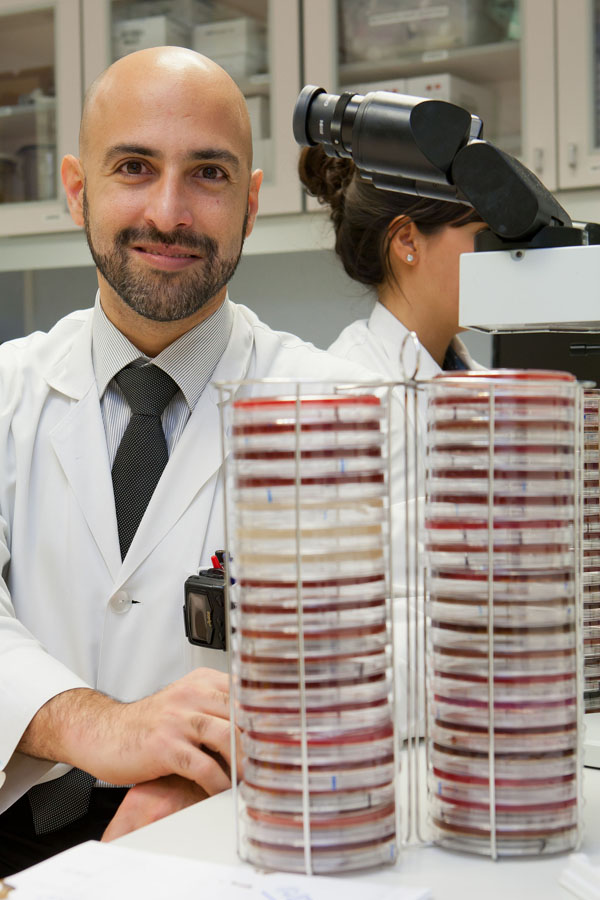A roadmap for adding ivermectin to the malaria drug arsenal
Carlos Chaccour, researcher of the University of Navarra, is one of the scientists leading this ISGlobal study.

The researcher Carlos Chaccour is part of a group of experts from the high school Barcelona Global Health (ISGlobal) that has published a roadmap to evaluate, and subsequently implement, ivermectin as a malaria vector control tool . Alongside this scientist, Regina Rabinovich, also a professor at the Harvard School of Health, is leading the study. The 'Ivermectin Roadmap', published in the American Journal of Tropical Medicine and Hygiene, includes a foreword signed by William C. Campbell, award Nobel Laureate and co-discoverer of the drug.
Malaria-transmitting mosquitoes have become increasingly resistant to the insecticides used to treat mosquito nets and spray inside homes. In addition, they can bite outdoors, where people are not protected, or indoors, when they are not sleeping under nets, resulting in what is known as residual malaria transmission.
"These challenges have inspired the idea of using ivermectin, a drug normally used to treat parasitic worms, but also capable of reducing the life span of mosquitoes that feed on people or livestock treated with the drug, as a complementary vector control tool ," explains Carlos Chaccour, researcher of high school of Tropical Health at the University of Navarra. The hypothesis is that, administered at the community level, ivermectin can reduce malaria transmission through its impact on the mosquito population.
Indeed, "the results of several recent programs of study and trials have positioned ivermectin as a unique drug in its class to strengthen malaria vector control," says Regina Rabinovich, director of the Malaria Elimination Initiative at ISGlobal, a center supported by "la Caixa". The advantage is that the drug has a different mechanism of action than the insecticides currently used, and that it would also have an effect on mosquitoes that bite outside the home. "Therefore, ivermectin can circumvent two major challenges in malaria control (insecticide resistance and residual transmission), thus helping to end this deadly disease", adds Carlos Chaccour, researcher of ISGlobal and director scientist of project BOHEMIA, which will evaluate, among other things, the impact of mass administration of ivermectin to people and livestock on the prevalence of malaria in Tanzania and Mozambique.
tool control by 2024The ivermectin roadmap provides a comprehensive view of what is needed to enable it to be used as a vector control tool by 2024. It was developed by a group of experts from different disciplines-from medical entomology and modeling, to tropical disease programs and veterinary medicine-with funding from the Bill & Melinda Gates Foundation, and is the result of literature reviews and discussions with regulatory agencies, funding and policy bodies, pharmaceutical companies, and future implementing partners.
The different actions and steps required for this 'One Health' strategy, from concept test to field deployment, are carefully described in the roadmap. It covers aspects including the definition of optimal doses and regimens for mass administration in humans and livestock, strategies to manage the risk of drug resistance, the relevance of environmental impact, ethical aspects, political commitment and community involvement, translation of evidence into policy, and aspects related to large-scale implementation, including coordination with campaigns already using ivermectin against other neglected tropical diseases in malaria-endemic countries.
A central issue will be to establish the safety of higher or repeated doses of the drug. For William C. Campbell, "feasibility will not just be a question of pharmacodynamic efficacy or executive efficiency. Safety is critical, and not just human safety, but ecological safety as well."
Another key aspect will be to ensure acceptability and adherence by communities and to explain that, although ivermectin has a direct benefit staff against worms and ectoparasites, its usefulness in terms of malaria will be indirect, by reducing transmission at the community level. "Both communities and policy makers need to understand well that this is a community impact," says Chaccour.
